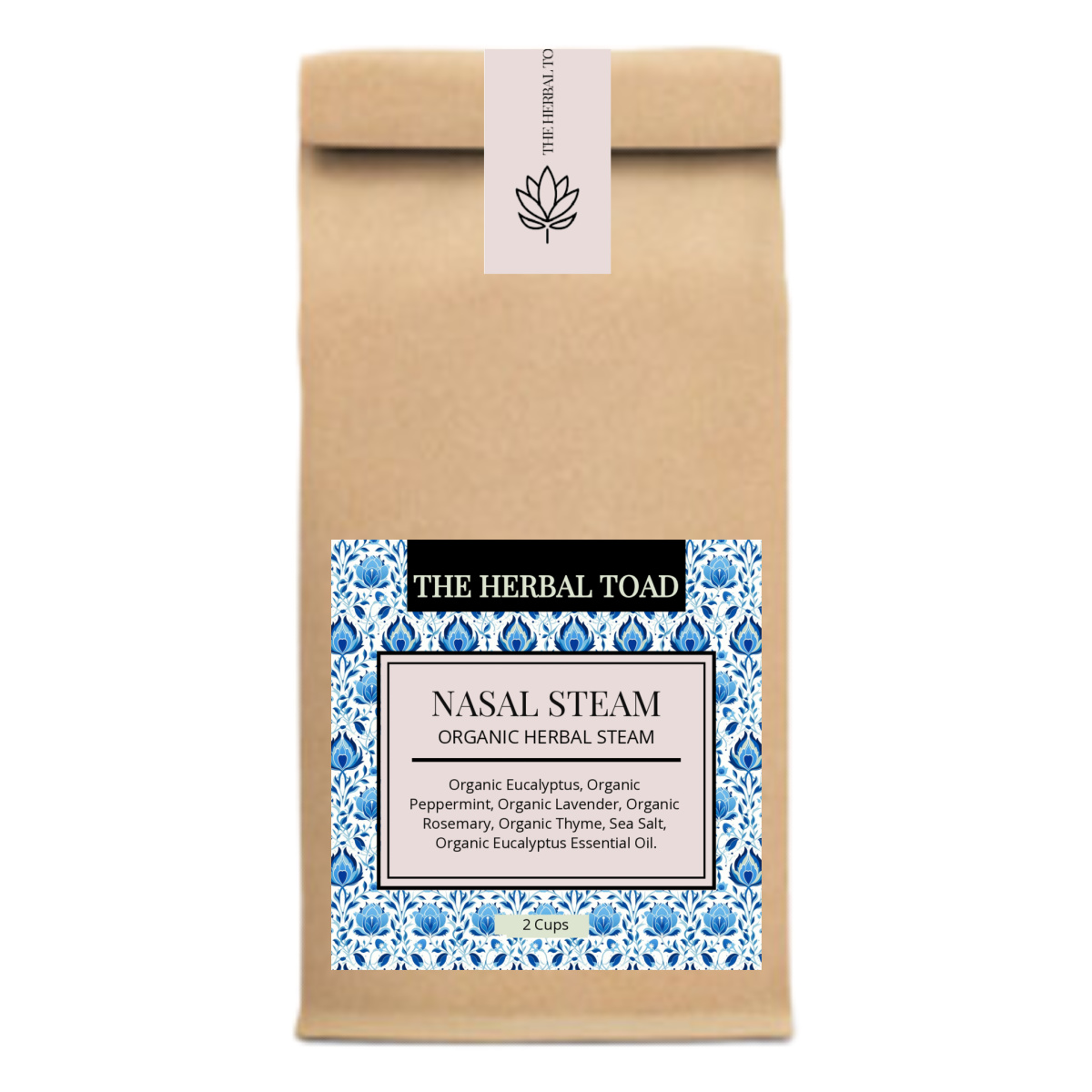The Practice of Steam Inhalation
Steam inhalation is the practice of combining herbs and essential oils with hot water to create therapeutic steam. Essential oil steams are a good way to deliver therapeutic properties directly to the airways for relieving congestion, aches, and general discomfort of colds, flu, and other virus. The soothing warmth and moisture penetrates airways to help loosen and move mucus, delivering the herbs’ antiseptic, decongestant and airway-relaxing constituents right where they’re needed.
Herbs for Nasal Steam
Nasal Steam
The herbs in our Nasal Steam contain a natural source of essential oils of Eucalyptus, Peppermint, and Lavender. This combination has been shown to be antibacterial and antiviral, and effective for cough, congestion, sinus issues, and more as shown below.
Essential Oils for Cold, Cough, Congestion, and Flu Virus
Note: Check with your doctor to see what is appropriate for you and your life stage before introducing anything new to your wellness protocol.
Eucalyptus
A study published in the Alternative Medicine Review found that eucalyptol, the main component in eucalyptus, has antimicrobial properties and may fight off the bacteria that cause illnesses. Eucalyptol may also help to reduce inflammation, relieve pain, and ease muscle tension that can result from a cold or flu.
Oregano
Oregano essential oil contains a high level of a potent compound called carvacrol. Authors of a 2014 study found that carvacrol is an effective antimicrobial agent that fights off many types of germ. We often suggest oregano oil to our clients when they are struggling with sinus issues.
Lavender
A 2015 animal study suggested that lavender essential oil may have analgesic, or pain-relieving effects, and that it also reduces inflammation. We often use lavender or lavender oil to reduce pain and swelling in the sinuses.
Peppermint
When menthol, a property of peppermint essential oil, is inhaled, it creates a cooling sensation that can soothe or numb a scratchy throat. A 2013 study suggests that when a person uses peppermint oil, it can help to relax the bronchial muscles. This may explain why the oil can ease breathing in people with coughs.
Rosemary
Rosemary is a common garden herb. Like eucalyptus, it contains the compound cineole. A study published in the journal Cough found that cineole, a major constituent in rosemary essential oil, helps to break up mucus and reduce inflammation.
Frankincense
Frankincense has been valued for its many benefits, one of which is the effect on the respiratory system. It has been used to treat coughs, catarrh, asthma, and bronchitis.
Tea Tree
Tea tree essential oil can inhibit the growth of the bacteria that cause sinus infections and respiratory issues.
Safe Use for Children
You should not use steaming with young children as there is a risk for burning. Please note, Oregano is NOT child safe. The safest way to deliver the beneficial properties herbs to children for the purpose of congestion and cough is to add child safe essential oils to bath water, or use the Nasal Steam as a bath tea. Do not use essential oils of oregano with children. If not using the bath tea method with herbs, safe essential oil choices for children are lavender, frankincense, and tea tree, diluted in milk (to foster emulsion) and added to bath water.
How to Use Herbs and Essential Oils for Steaming
1 Quart Water
1/2 cup Nasal Steam Herbs
and/or 3 to 6 Drops Essential Oils
- Boil water. Turn off heat. Add herbs. Cover and let steep for 5 minutes.
- If adding essential oils, otherwise you can skip this step. Add to a nonreactive bowl, such as glass or ceramic and add oils.
- Lean over and take an experimental breath. If it feels comfortable, drape a towel over your head and breathe deeply through your nose if you have a cold or sinus infection, or through your mouth if you have a cough.
NOTE: Keep eyes closes and maintain a comfortable distance to avoid a burn or irritation.
Recent Posts
-
Meet the Herbs in Nutri Nutritional Tincture
Nutri Nutritional Herbal Tincture is a blend of herbs that have been used in my family for generatio …14th Jun 2025 -
10 Amazing Elderberry Benefits
While the most common type of elderberry is Sambucus nigra, or black elderberry, there are several v …24th May 2025 -
Elderberry Jam Recipe
This is the time of the year that I start preparing herbal preparations for fall and winter, and tha …22nd Aug 2024




